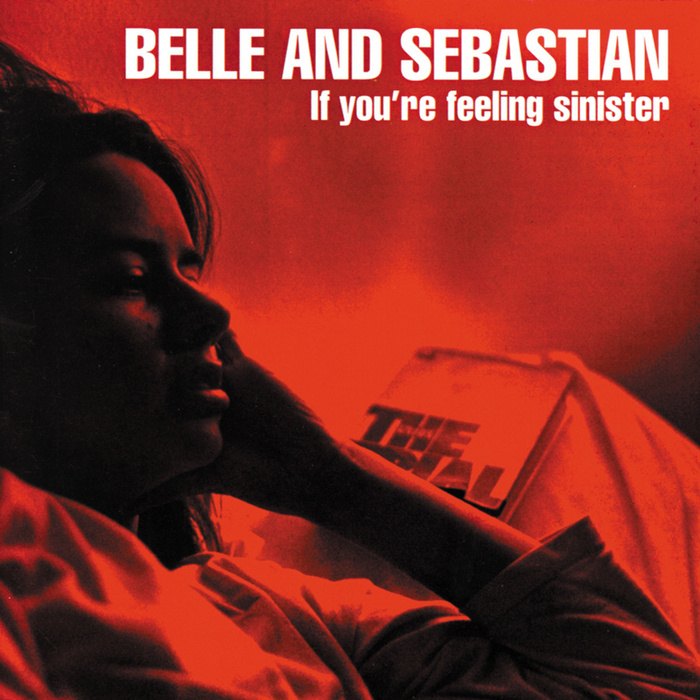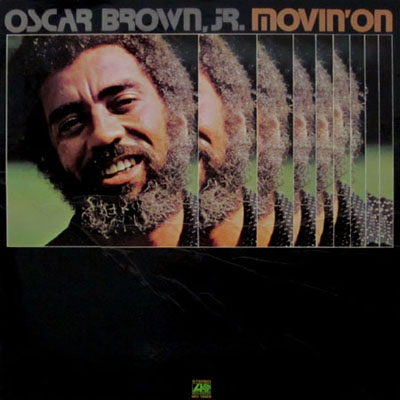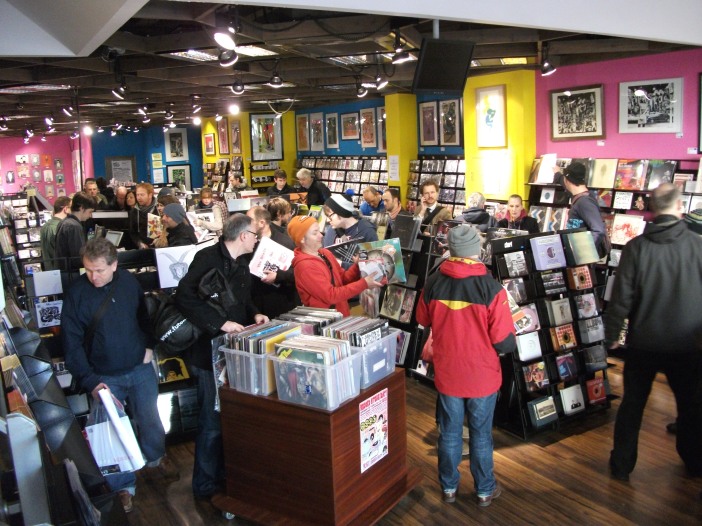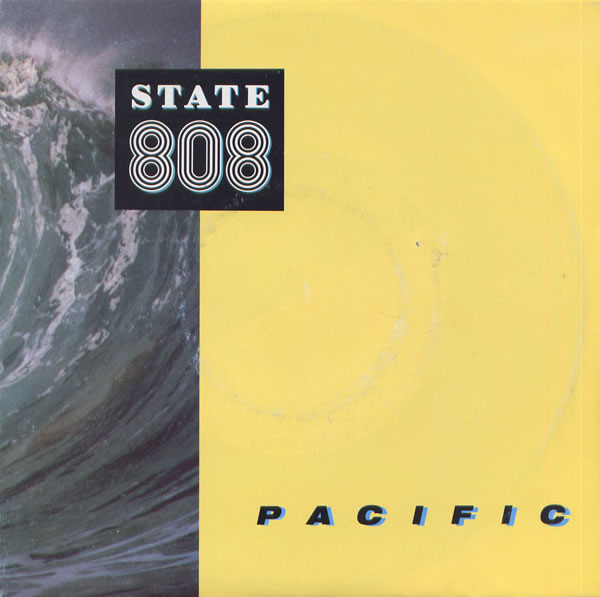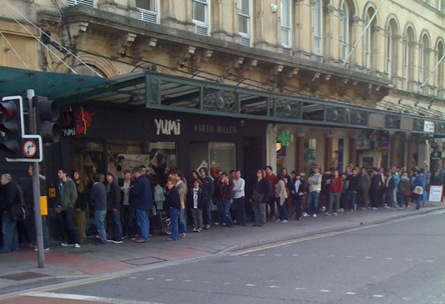April 20th was a surprisingly pleasant day, emerging delicately from weeks of rain and brutally cold mornings. For me, it began at 3:25 am in the not especially sleepy centre of Bristol. A purposeful walk up Park Street followed, witnessing the tail end of some fairly substantial nights out. A heaving kebab shop at ten to four in the morning is a new sight to me. I’m a record collector: what do you expect? By four, I was fifteenth in the queue at Rise in Bristol and by six I was nursing a hot drink in Friska, the wonderful cafe which now inhabits most of their ground floor. It was a splendid morning and I could go on, but this year’s Record Store Day writeup is not really about me. Immediately after the event, I asked for your experiences of the day and your opinions on how it is run. You can still contribute here. The record shop debrief has already happened in London, but I’m hopeful that there is scope for a little dialogue this year between the organisers and the fans. We support those shops all year round and, judging by your responses, also rather enjoy RSD, but there seem to be few kinks to iron out, a few grumbles to pacify, some legitimate concerns to be heard.
Over the next week or so, Just Played will feature various musings on the event from the perspective of you – the record buyers – which, I hope, will largely serve to underline the massive appreciation of independent record shops that exists amongst a growing community. To begin, I am absolutely delighted to be able to host a guest piece from acclaimed music writer, host of 6 Music’s ‘Vinyl Revival’ and all round record shop connoisseur, Pete Paphides.
***
Midnight on Friday night and I still don’t know which record shop I’m going to head for. On previous years, I’ve headed for Berwick St on the basis that there are a few shops there to spread the demand, but with every passing year the queues get bigger. Flashback on Essex Road would be a more sensible option, but they open at 10am, and if you’ve already been awake since 4am, those extra two hours (most shops open at 8am on Record Store Day) are really going to pinch. Up in Manchester, they’ve been queuing outside Piccadilly Records since late on Friday evening.
I’m 43 and I’ve been buying vinyl from record shops for most of my life. For a brief period in the 90s, when vinyl appeared to be on its last legs, I stopped going to record shops. For about two years, I found myself struggling to connect with music in the way that I had done before I started writing about music for a living. Finally, I realised that the thing that made it exciting again was the thing that made it exciting in the first place. It was the same thing that I felt the first time I went to Discus Records in South Yardley, having been told by my mum that I could pick any two records I wanted (I chose The Barron Knights and John Travolta & Olivia Newton-John). I don’t remember too much about Discus, but I do recall a couple of curved hoods fixed into the wall at head height – the sort that, in the 60s, used to form the acoustic booths where people would try out the records they were thinking of buying. In 1979, there were no longer record players in the ones at Discus and, without them, I couldn’t work out what the booths were for.
Record shops. Thirty-four years later, that’s still pretty much how this works for me. The velocity at which, say, Spotify allows me to consume new music dilutes the entire experience. It appeals to the worst of my nature. If I don’t understand what I’m hearing, then I just move onto something more immediate. It makes me more passive. In fact, I think it makes us all into mini-Simon Cowells, sitting back on our easy chairs, hands poised on the buzzer, imperiously daring artists to entertain us. Does your favourite artist want you to listen to them on Spotify? It’s unlikely. In the late 90s, Spotify and iTunes were beyond the realms of most people’s imaginings, but my charmed music journo life gave me a taste of it – the free CDs landing on my doormat at a greater velocity than I could hear them made a similarly passive listener of me.
The record that pulled me back in was Belle & Sebastian’s ‘If You’re Feeling Sinister’. Beautiful as it looked on the CD, it was pretty apparent from the filtered image of the girl on the sleeve and the impeccably chosen font, that this was a design for an actual record sleeve. And, as with The Smiths a decade previously, the record sleeve and the music to which it paid host were part of one complete package. So I went to a shop on Hanway Street W1 and there it was. And not just ‘If You’re Feeling Sinister’. Record shops were also where the fun was.
Central London is still ace for record shops – within a half-mile radius of Berwick Street there are half a dozen – but there’s something about a local satellite town shop that elicits a different thrill. I guess that feeds back to those formative experiences at places like Discus and my main childhood record shop Easy Listening in Acocks Green, shops that would have to run the gamut of local musical taste – from grandmothers after the TV-advertised Julio Iglesias record to the local goth after a March Violets 12-inch. Those shops were just as much for everyone as, say, the fishmonger or the hardware store. When you found an obscure record you loved in those shops, it seemed to cement the connection between you and that record. It felt like you were rescuing it. But, more to the point, for most of the time I went to those shops, I wasn’t looking for obscure music. I liked chart music. I liked the ex-jukebox records that came in a sealed plastic bag, five for £1.25 with the titles of all five records typed onto the plain white sleeve of the top single.
I still like those sorts of shops now – which is sad, because there aren’t many of them left. Long immortalised in the lyrics of ‘Shakermaker’, Sifters in Manchester used to be one of them. These days it’s just secondhand records and CDs, but behind the counter, you can still see the specially made wooden shelf with 50 seven-inch size sections, each corresponding to a position in the top 50. When Bob Stanley and I visited the shop a couple of years ago, “Mr Sifter” aka Peter Howard told us that on the week of a really big number one – say, ‘Hello’ by Lionel Richie – they could expect to sell 100-200 copies.
David’s in Letchworth Garden City is one of those old-fashioned, there-to-reflect-the-needs-of-the-locale type of record shops that has, miraculously, kept going. Two years ago, I went there and picked up an Anne Briggs reissue and a few seven-inches of songs that I didn’t even know had come out on seven-inch. Not the indie stuff that always appears on seven-inch. But proper pop hits like McFly’s ‘Shine’ A Light and Sophie Ellis-Bextor’s ‘Bittersweet’. The sort of songs that are still, after all this time, most ideally suited to the format. There they were on the countertop in a wooden box marked “NEW RELEASES”, just like the box at Easy Listening thirty years previously.
So, when I wake up on the early hours of Saturday, I plump for David’s again. Who would be queuing in Letchworth at 5am? Thirty people, to be exact. I’ve layered up, but within half an hour, I start to lose the sensation in my toes. Just behind me are three people in their early 20s. Not an ounce of fat to spare between them. The sole woman among them has a huge rip in her jeans. There’s a blanket in the car. I feel like running back to fetch it for her. I ask one of them what he’s hoping to pick up. “Perhaps the Miles Davis? I’m not really sure.” Mostly, he’s here, because it’s a happening of sorts. And whatever he comes away with will effectively serve as a three-dimensional diary entry of Record Store Day 2013. And, of course, the records you actually buy are diary entries. You remember the shop; you remember what else you were doing that day; and, by extension, what was happening in your life at that time.
The other good thing about actually going to the shop – in fact, the best thing about record shops – is that you invariably come away with something you didn’t know you wanted. More than any other day, that’s worth keeping in mind on Record Store Day. After three hours of waiting – three hours made easier towards the end by the trays of tea and coffee served by shop staff – I’m in the shop. The queue takes you past racks of new vinyl. In the reduced section, I notice an album whose existence on vinyl is news to me – a selection of covers recorded by Elton John when he was a jobbing musician on budget price soundalike albums of current hits. Also on the record are a selections of songs he recorded for Joe Boyd’s publishing company Warlock. When Elton originally sang them, these versions of songs by Nick Drake and Beverley Martyn were intended not for public consumption, but to entice mainstream artists to record them. The odd thing about Record Store Day is that it drives people to extremes in order to procure releases on the list, and yet once they’ve got what they were after, they walk straight out of the shop, oblivious to the other rarities sitting there. Three years ago, the must-have RSD release was Blur’s ‘Fool’s Day’. By the end of the day, copies were changing hands on Ebay for £200. And yet, around the same time in RSD-participating store Sister Ray, a single copy of much rarer Blur release – their 300-only 1993 gig freebie ‘The Wassailing Song’ lay untouched on the wall for a reasonable £75.

Back at David’s, records by Stephen Malkmus, The Jesus & Mary Chain, The Velvet Underground, The Beta Band and Big Star are gone by the time I get there – but I secure Pulp’s ‘After You’, the seven-inch of two unreleased Paul Weller tracks and Low’s ‘In The Fishtank’ session with Dirty Three. No time to dwell on that though. I have to be at Phonica in Poland St to speak with Tom Ravenscroft for BBC 6 Music. From the exterior of the shop, you can see the massive HMV logo. Because HMV isn’t an independent record shop, it’s not allowed to participate in Record Store Day. From this vantage point – streets teeming with people scuttling between Berwick Street’s specialist indie stores – it’s hard not to feel a little sorry for the place, so far removed from its original purpose in 2013 that it wouldn’t occur to most people to buy a record there. Over to 6 Music in Western House to speak with Tom and Edith Bowman. Once we’re finished there, I leave the building and diagonally to my left I notice a Record Store Day banner draped outside a terraced townhouse on Langham Street. Just beside the buzzer is a sign that says, “ifmusic”. Up the steps and in the carpeted hallway are the pigeonholes of various offices and, among them, one that says: “ifmusic: 2nd floor.” Shops in places where you don’t normally find shops. Odd little rooms full of records. These are the sorts of things that collectors have dreams about. But up two flights of stairs is a room which thinks it’s a shop: a coffee table with two decks, and shelves and boxes full of records. “Are you here for Record Store Day?” I’m the only customer. On Record Store Day.
And the two blokes who work there – middle-aged, smart, dressed in a manner that suggests they have Gilles Peterson on speed-dial – are lovely. They’re more like tailors, sizing you up for a possible purchase – which could be a touch vexing, except for the fact that they’re incredibly good at it. He hands me a compilation I’ve never seen before called ‘Forge Your Own Chains: Heavy Psychedelic Ballads And Dirges 1968-1974’. And I’m thinking that I’m not sure I want anything heavy or dirgey on a day like this, but he places it on the turntable and an utterly celestial spell of sunkissed psych-rock – ‘Song Of A Sinner’ by Top Drawer obliterates all resistance. In my sleep-deprived state, with the sun streaming into a place that I’m not even sure exists, it all sounds divine: the stoned tidal funk that plays out under D.R.Hooker’s ‘Forge Your Own Chains’; the beatific motherly embrace of Ofege’s ‘It’s Not Easy’.
Yes, there’s a Record Store Day box too – and in there, I find a few more things that the Letchworth shop didn’t have: a repress of an Italian electronic instrumental album called ‘Desert’ by Antonio Vuolo and Elio Grande and a 12-inch of remixes by The XX. But, once again, the real magic doesn’t really come from what I was hoping to find. It’s the stuff I didn’t know existed. There’s an album by Oscar Brown Jr – who I knew through a track called ‘Gang Bang’ on a great Warners comp called ‘People Get Ready: Protest Songs From The Atlantic & Warner Jazz Vaults’. It’s a sublime flute-laden tale that details what happens when the urge to riot is superceded by the urge to fuck. So here’s ‘Movin’ On’ – the album that originally featured ‘Gang Bang’, and it’s £10. “Can I put this on?” I ask one of the ifmusic guys who may or may not exist. The qualities that make ‘Gang Bang’ so brilliant pervade almost every other song.
Just one more stop now. Flashback Records on Essex Road have called to see if I fancy doing a DJ set as part of their Record Store Day festivities. I ask if they’d let me do a set of songs taken from their bargain boxes outside and they kindly agree. With five minutes to spare, I get there and amass my “set.” The tempo of the day has decelerated in the afternoon sun and the queues have dissipated to a trickle of curious shoppers. Most cheap records fall into one of two categories: the rubbish ones and the ones that are so brilliant that they sold millions and, as a result, are too abundant to be worth anything. I cue up ‘Precious’ by The Jam; ‘Legend Of Xanadu’ by Dave Dee Dozy Beaky Mick & Tich; ‘Rock The Boat’ by Hues Corporation; ‘Always On My Mind’ by Pet Shop Boys – the records you’ll always find in the kitchen at parties. Every one a winner; every one a pound. I’m sad that I didn’t locate the Stephen Malkmus record – yet, in terms of pure pleasure, I’ve long since got ten times more value out of my own copies of the records I played at Flashback. Probably a good time to regain that perspective. Not least because on this, of all days, perspective is as scarce as the very records that made you join a freezing queue in Letchworth at 5am.
Read more of Pete Paphides’ writing on his fabulous site ‘Hidden Tracks‘
